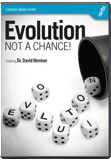
“Evolution Is a Fact.”
Argument 1
Explore the 12 Arguments Evolutionists Should Avoid series to prepare yourself with answers to common yet faulty assertions by evolutionists.
When our core beliefs are attacked, it’s often easy for humans to retreat to statements such as this: “My belief is a fact, and yours is wrong.” That’s exactly why we cannot trust mere human understanding to explain the unobservable past—emotion and pride get in the way. Evolution is not a fact no matter how many times evolutionists say it is. It’s a framework built on assumptions about the past—assumptions that will never have direct, first-hand, observational proof.1
Evolution is a rather fluid word, and people often equivocate when using the term. Unless stated otherwise, for the purposes of this series, “evolution” does not refer merely to biological evolution; rather, it encompasses the entire belief system that our universe and everything in it came into existence through random processes. If evolution were a scientific fact, not fiction, it should be falsifiable. However, even if it were a good theory, the evidences evolutionists often give fall under historical science, not operational science. In his book Evolution Exposed: Biology, Roger Patterson defines those two terms.
Operational (Observational) Science: a systematic approach to understanding that uses observable, testable, repeatable, and falsifiable experimentation to understand how nature commonly behaves.
Historical (Origins) Science: interpreting evidence from past events based on a presupposed philosophical point of view.2
Operational science is how most people think of science: the scientists in white lab coats making predictions, testing their hypotheses, measuring reactions, repeating experiments, and recording observations. This is the kind of science that led to the discovery of scientific laws like the law of universal gravitation, the understanding of processes like heredity, and the advancement of technology and medicine that enhances and saves lives.
Operational science involves “a systematic approach to understanding”—namely, the scientific method in order to prove a theory. Let’s take a quick look at the steps of the scientific method.
- Make observations.
- Formulate hypothesis.
- Make predictions.
- Perform experiments.
- Repeat experiments and alter hypothesis/predictions if necessary.
Molecules-to-man evolution cannot be tested in this way. We have not observed one kind of creature changing to another. We cannot repeat events in the past nor can we observe them. We cannot design a falsifiable experiment to prove or disprove that evolution happened in the past.
When a news article reports that a “missing link” has been found or that a rock has been dated as millions of years old, those claims are not substantiated by the scientific method. They are based on assumptions about the past—assumptions that natural selection and mutations led to changes from one kind to another or the assumption that conditions and processes of the past were continually the same as we see today (uniformitarianism).
Evolution cannot be classified under operational science because it is a philosophical framework one assumes when interpreting past events. For most evolutionists, this philosophical framework involves naturalism and materialism—worldviews which teach reality consists only of matter and that scientific laws are sufficient to explain all phenomena. These philosophies are irrational because if they were true, one could never know they were true since the preconditions of intelligibility do not exist. That is, if evolution happened, then we have no basis for laws of logic, uniformity of nature, and morality. Being based on these irrational philosophies rather than the scientific methodology, evolution is not an operational science theory, much less a scientific fact. However, the Bible provides the rationale for each of these preconditions. So evolutionists must steal from the biblical worldview in order to build their own position. Their position appeals to themselves—human ingenuity in making up a philosophical framework—as the ultimate authority (in effect, claiming to be God) when examining evidence of the past (Psalm 14:1; Romans 1:18–23).
Creationists also interpret evidence based on their worldview, so they come to different conclusions about historical science. However, creationists have a historical document with eyewitness accounts (2 Peter 1:16). The Bible claims to be inspired by the Eyewitness of the world’s beginning (2 Timothy 3:16; cf. John 1:1–3).
God asked the following rhetorical question to Job: “Where were you when I laid the foundations of the earth? Tell Me, if you have understanding” (Job 38:4). Yes, it takes faith to trust in God and believe His Word is true (Hebrews 11:6), but it is a defensible and well-reasoned faith (Hebrews 11:19). On the other hand, how much blind trust is required to believe man’s idea of evolution, which—far from fact—does not even qualify as a theory?
More Info
Footnotes
- “12 Arguments Evolutionists Should Avoid,” Answers in Genesis, https://answersingenesis.org/theory-of-evolution/12-arguments-evolutionists-should-avoid/.
- Roger Patterson, “What Is Science?,” chapter 1 in Evolution Exposed: Biology (Petersburg, KY: Answers in Genesis, 2006), February 22, 2007, https://answersingenesis.org/what-is-science/what-is-science/.
Recommended Resources

Answers in Genesis is an apologetics ministry, dedicated to helping Christians defend their faith and proclaim the good news of Jesus Christ.
- Customer Service 800.778.3390
- © 2024 Answers in Genesis





